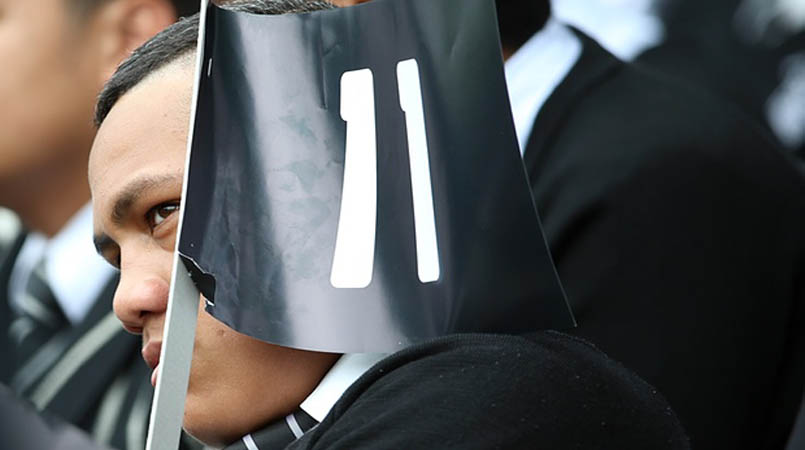
Elevens were everywhere at Eden Park this afternoon.
On arrival at the stadium for a service to celebrate the life of Jonah Lomu, the public were handed black paper flags with a silver fern on one side and the number 11 on the other. Lomu’s two young sons, Brayley and Dhyreille, wore on their backs the 11 that their father made his own as an All Black winger, as did many of the pallbearers. The stage in the centre of the ground was draped on each side in a giant purple 11, the Tongan colour of mourning. Even the rugby posts, specially reinstalled on a warm, overcast summer day, poked 11s into the sky.
About 8,000 people crowded into the South Stand at New Zealand’s most famous rugby ground to celebrate the life of the world’s most famous rugby player, who died suddenly on 18 November from a cardiac arrest related to the rare kidney condition with which Lomu had struggled with for most of his career.
The service, which followed earlier memorials in recent days for the Pacific community in South Auckland, and at his former school Wesley College, included a mix of English, Maori and Tongan performance and tribute. In attendance were dozens of current and former All Black players and coaching staff, along with former foes from overseas such as Australia’s George Gregan and Tim Horan.
Among the pallbearers were former All Black flankers Michael Jones and Dylan Mika, who together with former All Black coach John Hart had played important parts in arranging the service on behalf of Lomu’s wife, Nadene, as well as John Mayhew, the former team doctor who developed a close friendship with the giant winger as he battled kidney problems.
The chairman of World Rugby, Bernard Lapasset, who travelled from France for the service, said Lomu had “inspired millions around the world with his incredible strength and power”.
Lapasset recalled how the winger’s emergence on the global stage during the 1995 World Cup in South Africa “took our sport to new level and profile ... When I think of that amazing tournament in South Africa 20 years ago, I think of two people. Off the field, I think of Nelson Mandela. On the field, I think of Jonah Lomu. Both men inspired millions around the world.”
Eric Rush, Lomu’s former team-mate and mentor in both the NZ sevens and All Blacks side, moved the crowd to laughter and tears with his tribute. Rush began by saying that he and his friend had always taken the mickey out of one another, “and that’s not going to change now”, promising to “tell a few stories about the big fella, and hope he doesn’t sit up”.
Rush said he “knew that Jonah was going to play well when the nostrils flared up because he took all the oxygen so nobody could use it”. Rush noted, too, however, that Lomu, who was raised in New Zealand and Tonga and grew up in a home with a violent father, was for a time the loneliest rugby player he’d met.
In a televised tribute, the New Zealand prime minister John Key, in Paris for the UN climate conference, said Lomu remained a role model to young Polynesian New Zealanders, proving “that you can come from anywhere in New Zealand and make it to the very top”.
Eleven was the theme of one of the most captivating moments in an affecting afternoon, a performance by students from the Tongan New Zealander’s old South Auckland school, Favona Primary. Dressed in scarlet tops, they sang: “Number eleven, our hero, in heaven / the nation’s favourite engine, our friend, our legend”.
The Eden Park crowd included many dressed in traditional Pacific clothing, as well as a sea of rugby jerseys from Lomu’s former sides, including the All Blacks, the Auckland Blues, the Wellington Hurricanes, and the Counties-Manukau provincial side.
One gentleman wore an England rugby jersey with No 15 on the back, an imaginative tongue-in-cheek tribute, presumably, to one of the most famous passages of play in rugby history, when Lomu steamrollered England fullback Mike Catt in the the 1995 World Cup semi-final to score a try that perhaps more than any other propelled him to stardom beyond the rugby world.
Lomu’s casket was carried from the stage, as it had arrived, to the sound of kapa haka and karanga (traditional calls) from the ground and the stands. A hearse inched him towards the exit, taking Jonah Lomu along the Eden Park touchline for one last, and by some distance the slowest, time.
A private funeral will be held at Lomu’s Auckland home on Tuesday.
